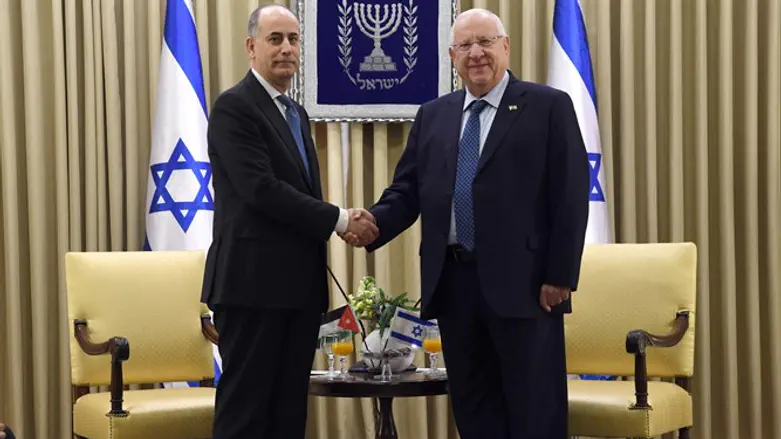
President Reuven Rivlin on Thursday received diplomatic credentials from the new Ambassadors of Croatia, Jordan, the Czech Republic, Egypt and Mongolia to the State of Israel at a ceremony at the President’s Residence in Jerusalem.
As each ambassador arrived, their country’s flag was raised and the Israel Police Band played their national anthem. The ambassadors inspected an IDF guard of honor and presented their credentials to the president. After an audience with the president, the new ambassadors signed the guest book and Hatikvah, the Israeli national anthem, was played at the end of the ceremony.
When the incoming ambassador of Jordan, Ghassan Majali, presented his credentials, President Rivlin welcomed him and noted that next year will mark the 25th anniversary of the Israeli-Jordanian peace treaty.
“We are determined to live in peace with our neighbors, and we are hopeful and optimistic that others will do as you have done. The good relations between our two countries are a legacy of the leadership of the late King Hussein. Please send my warmest wishes to His Majesty King Abdullah II,” said Rivlin.
The president continued, “We appreciate the key role that Jordan plays as an island of stability in our region. But we can still do more to broaden cooperation in areas that impact on both our peoples. We breath the same air and live on the same piece of land. When you lack water, we lack water. We must do more to find ways of confronting these challenges together. Another important project is the ‘Jordan Gateway’ that could link the port of Haifa to Irbid, Amman and Aqaba, and from there to the Arab world, creating thousands of jobs.”
The Jordanian ambassador presented his credentials and he, too, noted the important anniversary of the peace treaty that will be celebrated next year.
“We remember the huge efforts made by great leaders, the late King Hussein and the late Yizhak Rabin, who stood firm in the face of all odds,” he said. “King Abdullah believes that the peace treaty is a cornerstone for peace in the region and in the world and that a breakthrough in the Israeli-Palestinian peace process is a top priority for the Hashemite Kingdom. Thank you for your warm welcome, Mr. President.”
The president added, “We do not only live in the same neighborhood, we are really neighbors. We drink the same water and we breathe the same air. It is time that our two peoples get to know each other better.”

The incoming Egyptian ambassador, Khaled Azmi, also presented his credentials to Rivlin. The president began by noting that in a few months time we will mark the 40th anniversary of the Egyptian-Israeli peace treaty. He said he hoped that a way could be found to celebrate the event and to pass on the values of peace and partnership to the next generations.
“Since the peace treaty was signed nearly 40 years ago, we have welcomed six Egyptian ambassadors. Now you are the seventh. I wish you success during your time here,” Rivlin said.
The president also said, “We face similar challenges and our military and intelligence cooperation is of strategic importance. Together, we can face the challenges of terrorism and ISIS in Sinai and Gaza better. Under the leadership of your president, Egypt plays a key role in the Arab world as a voice of reason and moderation. We appreciate your efforts towards stability in the region, and particularly with the Palestinians in Gaza.”
The Egyptian ambassador thanked the president for his warm welcome and spoke about the anniversary of the peace treaty. “It was an important step and the vision of great statesmen, and it remains a pillar of stability and an example that should be followed around the region. Egypt remains committed to the peace treaty and to bringing peace to the whole region. We are proud of our history, which is a model of tolerance, co-existence and acceptance.”
The president added, “The Egyptian people play an important role in our region. There are advantages to peace, and ‘no more war’ is not just a phrase. It is important that the two peoples get to know each other.”
Jordan and Egypt remain the only two Arab countries to have signed peace treaties with Israel. King Abdullah II of Jordan announced recently that he had decided not to extend the part of the treaty with Israel in which Jordan leased lands in Naharayim and Tzofar to Israel.
Prime Minister Binyamin Netanyahu later said that while he acknowledges Jordan’s right not to extend the lease, his government will open negotiations with the kingdom to secure an extension of the lease, which is slated to end in October 2019.
Jordan’s Foreign Minister, Ayman Safadi, made clear recently that the kingdom’s commitment to uphold the peace treaty with Israel was not in question despite its decision to end the lease of the lands in Naharayim and Tzofar.
Egypt-Israel ties have been formally cold at times, and Egypt's political elite has remained hostile to any normalization of ties with Israel.
Ties appear to have improved under President Abdel Fattah Al-Sisi, who took power in 2013 after the army ousted Islamist President Mohammed Morsi of the Muslim Brotherhood.
Earlier this week, Sisi hailed the peace agreement between Egypt and Israel as “stable and permanent”, adding that most Egyptians supported the peace treaty.
